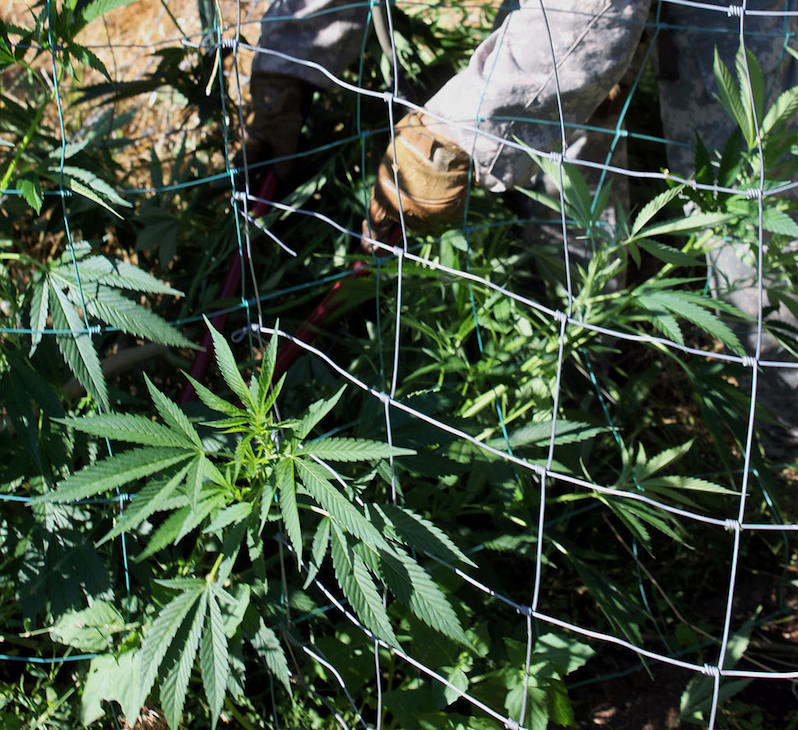New Investigative Report Sheds Light on Sexual Abuse at Marijuana Farms
Female “trimmigrants” who arrive in Northern California during prime growing season face dangerous conditions and lack of legal support systems.
A law enforcement representative cuts down a marijuana plant at a Northern California farm. (Wikimedia Commons)
“Come harvest season, trimmigrants arrive from all over the country and world — college students and artists, working professionals and tourists, homeless hippies and other wanderers,” writes Reveal News’ Shoshana Walter. “Trimmigrants,” she explains, get paid “wages far higher than typical migrant farmworkers” for trimming marijuana buds on farms scattered across Northern California, an area described as the Emerald Triangle. Many of the workers are women, and Walter’s investigative report reveals that they often face sexual assault, wage theft and other dangerous conditions while working at isolated marijuana farms.
Walter writes:
For women, the dangers are due in part to the gender dynamics in the industry. Growing is a male-dominated field, and many growers prefer to hire female trimmers. Several told Reveal that they believe women are more dexterous, making them more efficient workers. Others are looking for company. …
Of course, many marijuana farms are responsible operations. Most workers describe good experiences, including excellent pay, food and shelter. Many also welcome the unusual working conditions of an industry long at odds with mainstream culture and the law. Drug use on the job, for instance, is common.
In November, California voters will decide whether to fully legalize recreational marijuana. But such use remains illegal under federal and most state laws, and the culture of silence is so embedded in the state’s industry — the nation’s top black market supplier — it seems unlikely that legalization alone will dramatically alter the landscape for women toiling deep in the Emerald Triangle.
Walter highlights the stories of several individual women. “Terri,” for example, went to the small town of Petrolia to find work as a trimmer. She was repeatedly sexually assaulted by the town’s biggest — and most respected — marijuana farmer.
Isolated farms deep in the mountains, far from the reaches of law enforcement, have also become the perfect enclaves for sex trafficking. “The demand for female companionship has contributed to sex trafficking in these rural areas from all over the country and world,” Walter writes.
And for “trimmigrants” who are sexually assaulted, alerting the police is extremely problematic. Walter explains:
Rape usually goes unreported, but trimmigrants face particular pressure to avoid law enforcement. Calling police may rule out future jobs in the industry, especially if that contact alerts police to an illegal grow. …
Other conditions in pot country prevent victims from seeking any kind of help. Trimmigrants often lack the local connections or even the know-how to successfully navigate their way out of the wild, wooded terrain.
Because many work on illegal grows, they suspect law enforcement won’t do anything anyway. And because the industry attracts a young and transient workforce, victims — who may come with their own troubled histories — do not always recognize they are being abused. …
Despite evidence of a growing problem, law enforcement has put few resources into investigations of trafficking and sexual exploitation. Instead, police have conducted stings targeting prostitutes and sometimes their pimps.
Oftentimes, Walter notes, local law enforcement prefers to raid marijuana farms for the revenue. “During raids, officers have confiscated not just harvests, but also money, guns and even farming equipment,” she writes. Recent laws intended to regulate the marijuana industry in California “complicate matters,” Walter states. “[U]nder the new regulations, counties can ban growing altogether, and many have, preserving a highly profitable black market. Competition is increasing, and prices are likely to drop.”
Read the entire report here.
—Posted by Emma Niles
Independent journalism is under threat and overshadowed by heavily funded mainstream media.
You can help level the playing field. Become a member.
Your tax-deductible contribution keeps us digging beneath the headlines to give you thought-provoking, investigative reporting and analysis that unearths what's really happening- without compromise.
Give today to support our courageous, independent journalists.




You need to be a supporter to comment.
There are currently no responses to this article.
Be the first to respond.